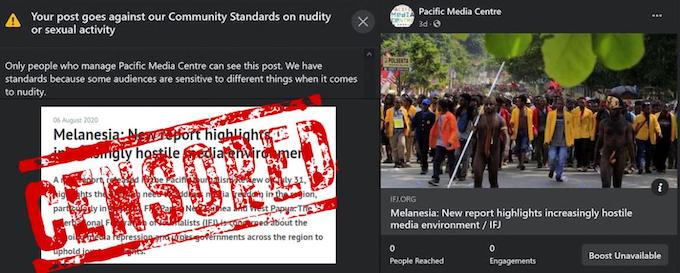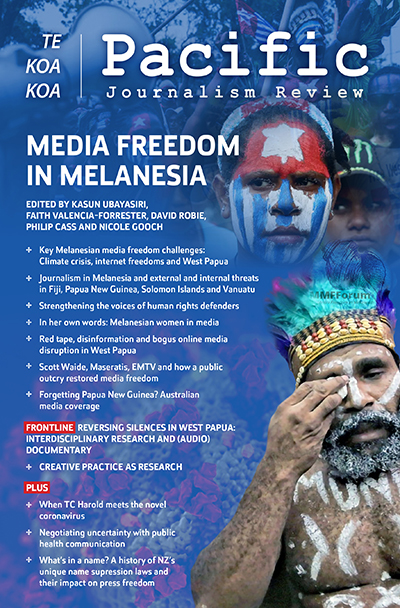
PARIS (Reporters Without Borders/Asia Pacific Report/Pacific Media Centre): Reporters Without Borders (RSF) has called on Facebook to restore an article that was censored for violating its rules on nudity and has urged the social media platform to be more transparent and responsible about respect for the free flow of information.
“Your post goes against our community standards on nudity or sexual activity” was the terse message that Professor David Robie, director of the Auckland-based Pacific Media Centre, RSF’s Oceania partner, received from Facebook whenever he tried to share an article about press freedom in Melanesia, especially the Indonesian provinces of Papua and West Papua, reports RSF.
Posted on August 6 on the International Federation of Journalists website, the article described the contents of the latest issue of the Pacific Journalism Review, a research journal published by the Pacific Media Centre.
READ MORE: PJR warns growing risks and hostile laws ‘silencing’ Melanesian media
Facebook criticised for pulling article with West Papuan pic - RNZ Pacific
Facebook’s algorithms censored it because, according to an automatic message sent to Dr Robie, “some audiences are sensitive to different things when it comes to nudity”.
The closest thing to nudity in the IFJ article was a photo of an anti-racism protest by Papuan students showing two of the participants in traditional highlands costume – consisting of necklaces and penis sheaths.
‘Tyranny’ of algorithms
“Anybody with common sense would see that the photograph in question was not ’nudity’ in the community standards sense of Facebook’s guidelines,” Dr Robie said, condemning the “tyranny” of the platform’s algorithms.
A former journalist himself as well as an academic, Dr Robie tried to report the mistake to Facebook three times on August 7, without success.
“There is no proper process to challenge or appeal against such arbitrary rulings,” he said.

RSF contacted Mia Garlick, the person responsible for Australian and New Zealand policy at Facebook, to get her position on this issue, but had not received any substantive response at the time of writing.
“This utterly absurd case of censorship shows the degree to which Facebook’s arbitrary algorithms pose serious threats to the free flow of information and, by extension, to press freedom,” said Daniel Bastard, head of RSF’s Asia-Pacific desk.
“As Facebook has imposed itself as a leading conveyor of news and information and, as such, is bound by the requirements of responsibility and transparency, we call on its regional desk to immediately lift the censorship on this article.”
Exploiting algorithms
This is not the first time that Facebook has censored content about the rights of Indonesia’s Papuan population on “nudity” grounds. It deleted a Vanuatu Daily Post article in April 2018 because it was accompanied by a photo of Papuan warriors in traditional costume taken by the Australian photographer Ben Bohane in 1995.
Pro-Indonesia trolls and fake Facebook accounts are known to report this kind of photo to Facebook, exploiting its algorithms to get content they dislike censored.
The issue of West Papua, the Indonesian-ruled western half of the island of New Guinea, is taboo in Indonesia and accessing its two provinces is very difficult for independent journalists, who need a special visa to go there.
When pro-independence demonstrations erupted in August 2019, the Indonesian authorities imposed an internet blackout on the region, preventing journalists from covering the protests.
Indonesia is ranked 119th out of 180 countries in RSF’s 2020 World Press Freedom Index.
Republished from the Pacific Media Centre’s partner Reporters Without Borders’ website.



